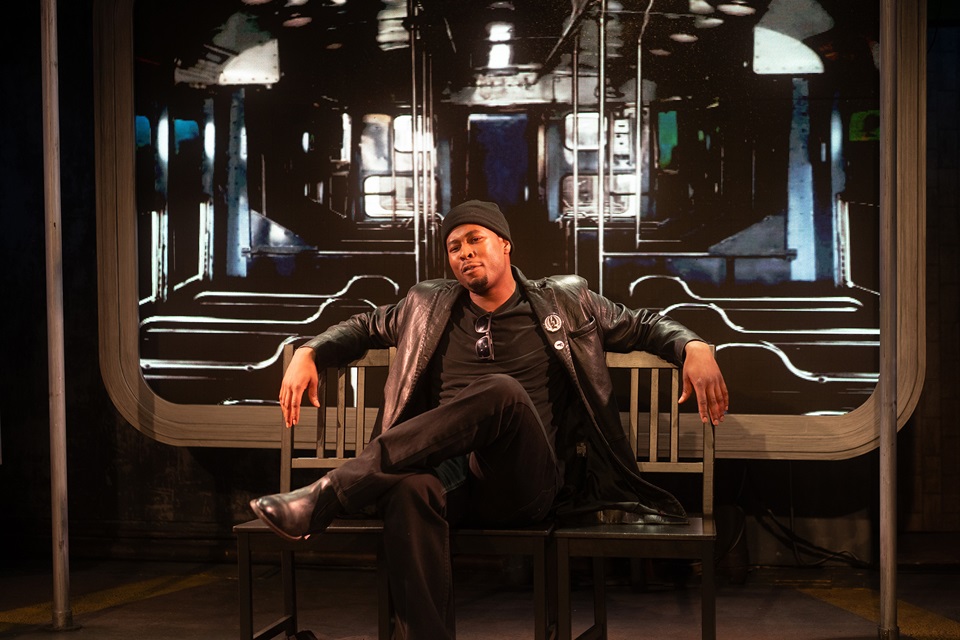
LOS ANGELES — J. Alphonse Nicholson is one amazing actor not to be missed. In a 90-minute one-act show that more than satisfies as a full evening of theater, he inhabits five different Black characters as a sort of African-American Everyman, ranging from a minstrel in the early 1910s to a wise, but semi-crazed street person in the 2010s.
The Fountain Theatre, long renowned for its timely, pioneering productions, presents the West Coast premiere of playwright Howard L. Craft’s Freight: The Five Incarnations of Abel Green, a century’s worth of journeying across America, directed by Joseph Megel. The limited 21-performance schedule runs through Dec. 16, and this critic says, “Don’t miss it!”
Nicholson reprises his 2015 New Federal Theatre off-Broadway tour-de-force star turn that garnered Freight a host of rave reviews, including a New York Times “Critic’s Pick.”
The five incarnations of Craft’s Everyman range from the early 20th-century minstrel to a faith healer known as “The Instrument of God” in the Depression ’30s, a snitch against the Black Panther Party for the FBI in the late 1960s, a B-actor in the 1980s who’s finally disgusted with the Blaxploitation roles he’s assigned, and a deranged “Saturn-Bound Man” in the 2010s, who consciously chooses to live on the street after a successful, but disillusioning career as an unethical mortgage broker in the leadup to the financial crisis of 2008.

Despite the wide range of personas, locales and time dimensions, in each of these avatars, Abel Green’s transformations all have common features. The “freight” of the title refers to Abel’s constant movements by train or subway car, where he is usually seen carrying a suitcase with an appropriate change of clothes. The word could also connote the extra burden, the heavier pack a Black person in America bears throughout life. He also has some guiding spirits—helpers and detractors—with recurring names, such as William Benson, Mary Bingham and Alonzo Price, and repeated place names of towns, streets and parks all named Jefferson. Perhaps that name itself is intentionally ambiguous and contradictory, signifying a Revolutionary-Era Enlightenment hero, chief drafter of the founding documents of our nation, who was also a slaveholder.
On stage with Nicholson is a fairy-like figure named “The Universal Flow,” played by Sidney Edwards, a sprite-woman who wordlessly serves as propmistress, bringing onstage or handing the actor the material objects he needs for his next impersonation. The decades slip by in her deft, dancelike movements.
“Freight operates on the premise that a person’s spirit, or soul, comes to the world because there is something the soul needs to learn,” says playwright Craft. “If the soul does not learn it, then it comes back to the world again and again until it’s successful. The soul can exist concurrently in different time periods, in multiple dimensions of the same universe.”
Speaking of Nicholson, Megel and himself, Craft explained in an interview that “The three of us have great chemistry…. This is not the first piece we’ve done together. I’m from Durham [N.C.] and Alphonse is from Greensboro; there are a lot of similarities in these places. He just really gets the rhythm of my writing. And Joseph has a way of pulling things out of an actor, and out of a playwright. He has a very light touch, but he brings so much up.”
The creative team for Freight’s Fountain production includes scenic designer Joel Daavid, lighting designer Alison Brummer, sound designer Marc Antonio Pritchett, video designer Eamonn Farrell, costume designer Danyele Thomas, and props designer Rebecca Carr. The production stage manager is Kaitlyn R. Cramer.
“All Negroes are actors by necessity,” intones the Minstrel, “making people laugh all across the nation.” They must master the art of disguise and impersonation. One imagines the author has read his W.E.B. Du Bois: “One ever feels his ‘twoness’—an American, a Negro; two souls, two thoughts, two unreconciled strivings; two warring ideals in one dark body, whose dogged strength alone keeps it from being torn asunder.”
An example is set early on when he and his partner, fellow minstrel William Benson, approach a small town in the South where they are scheduled to perform. Not far out of town they encounter the remains of a lynching, graphically described with mention of the peanut shells and cigarette butts left behind by the bystanders, even a child’s doll, indicating that in this country-fair atmosphere, even the kids tagged along for the fun. And that night the minstrels were expected to put on a hilarious show—“our best performance ever,” the minstrel recalls. The allusion to the sad clowns of Pagliacci could not be missed, except here the minstrel paints his Negro face an even darker shade for his act.
As the faith-healing leader of the Church of Revelation, Abel joins up with Alonzo, author of a new sacred text called The Way of Heavenly Glory, and the two hucksters gain wide reverence for their seemingly magical powers and some intimations of what today we’d call “liberation theology.” Until Alonzo instigates a coup and throws Abel to the side of the road, left for dead. Abel survives, becomes a Pullman porter and teaches the Bible to the other men working the train.
I hesitate to say too much about the next few roles this Negro “actor by necessity” must assume, for fear of too much plot-spoiling, but the stories are deeply human, empathetic, and even politically toxic as some Black Everymen were forced into becoming for their very survival. As “The Snitch,” he justifies himself saying, “A hero ain’t nothin’ but a goddam sandwich.” The playwright’s summation of the Black Panthers’ work seems fair and disingenuous as he tracks the government’s incremental criminal COINTELPRO campaign against it.
In the 1980s segment, about “The Last Great Black Actor,” Abel recapitulates his role as comforter to the sick, visiting his old friend and mentor—William Benson again—who is dying of AIDS. Once again, Abel must confront the dueling loyalties and identities, the terror and the compassion, required of a Black person in his time.

And in Abel’s remorse over all the crooked, subprime loans he foisted especially on the Black and Latino communities leading up to the 2008 meltdown, he has to recognize “money at the core of the American dream.” His own deeds led to horrific ends for people he loved.
Is a Christ-like vow of poverty truly the answer to the Black dilemma in America—or space travel to Saturn? The play ends on that note, not on some ringing hymn to the power of collective action that would, as a coda—to this play, at least—ring untrue. Rather, the character (and actor) bangs his rhythmic sticks on a couple of overturned plastic containers on Skid Row. “Let my drums speak my heart.”
A master has spoken. The words are by Howard L. Craft, and his instrument is J. Alphonse Nicholson. I’ve rarely been so taken by a piece of theater, nor so impressed by a solo act.
Freight: The Five Incarnations of Abel Green is performed Fri., Sat. and Mon. at 8 p.m., and Sun. at 2 p.m. through Dec. 16 (dark Fri., Nov. 24). Pay-What-You-Want seating is available every Mon. night in addition to regular seating (subject to availability). The Fountain Theatre is located at 5060 Fountain Avenue (at Normandie) in Los Angeles. Parking is especially tight in the area; leave time to find a spot. For reservations and information, call (323) 663–1525 or go to the company website.
We hope you appreciated this article. At People’s World, we believe news and information should be free and accessible to all, but we need your help. Our journalism is free of corporate influence and paywalls because we are totally reader-supported. Only you, our readers and supporters, make this possible. If you enjoy reading People’s World and the stories we bring you, please support our work by donating or becoming a monthly sustainer today. Thank you!












Comments